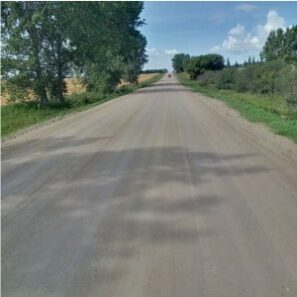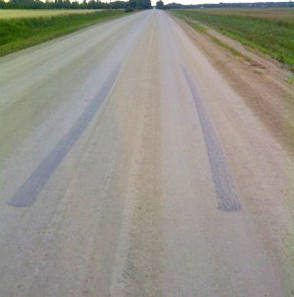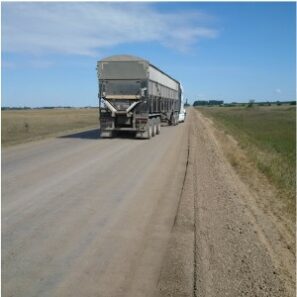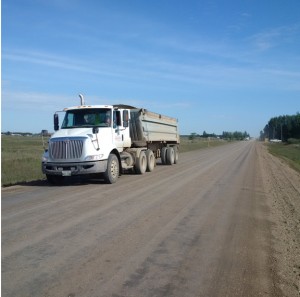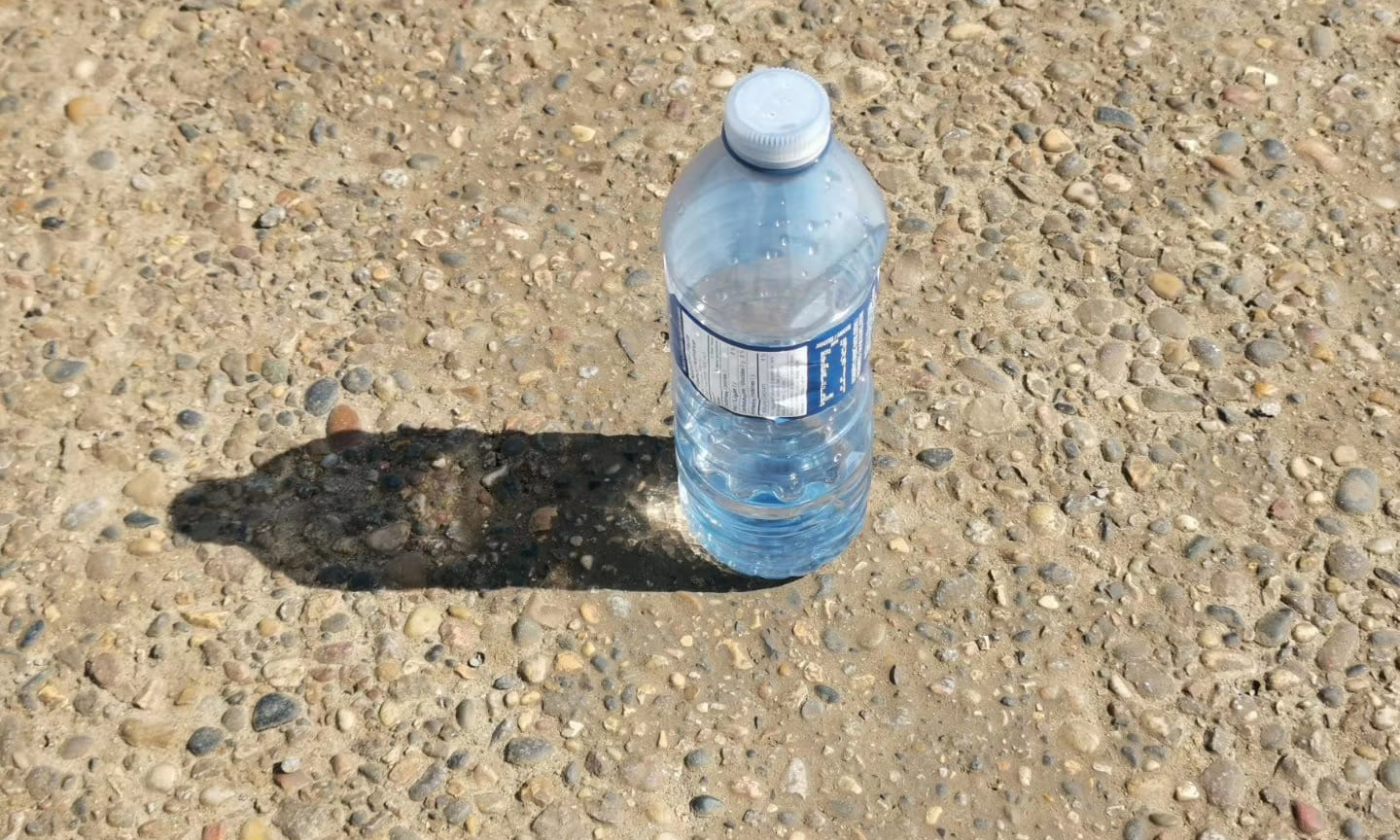Cypher Environmental has collaborated with Dr. Hamid Mumin of Brandon University for nearly a decade on a rural municipality road construction research project focused on soil stabilization and dust control. This project, jointly funded by Brandon University and Cypher Environmental, involves extensive laboratory analysis of the improved engineering properties of clay soils treated with Cypher’s ROAD//STABILIZR® and DUST/BLOKR®. Additionally, it included the evaluation of 3 miles of roads constructed with these products in the Rural Municipality (RM) of Cornwallis, near Brandon, Manitoba.

The project addresses the ongoing critical need for improved road construction techniques and stabilization of unpaved roads in rural and Northern Manitoba, as well as across Canada. The original scope of the project was to provide a cost-effective and sustainable solution using cheaper clay-rich aggregates and non-toxic organic catalysts, such as Cypher’s ROAD//STABILIZR® and DUST/BLOKR®. These products enhance the high-density packing and strong semi-permanent bonding of clay-aggregate mixtures, resulting in durable roads that require minimal maintenance. Successful implementation of this project would signal a significant advancement in road construction methods for rural municipalities and private industries, enabling more economical and sustainable road building.
In 2015, recognizing the necessity to demonstrate the efficacy of their soil stabilization and dust control solutions, Cypher Environmental initiated a detailed laboratory investigation in partnership with Brandon University. 2 miles of roads were built using Cypher’s road stabilization technology.
Located in separate areas with unique and differing requirements, the newly built roads showed excellent maintenance performance. Engineering reports were favorable, with compaction testing revealing densities as high as 110%, surpassing the typical target density of 95%
This research was conducted from 2015 – 2016, with results published by Cypher Environmental.
2015
Rural Municipality Road Construction at Lori Road
Lori Road is a heavily trafficked rural road that connects to Highway 110 and serves as a perimeter road around the City of Brandon. Its traffic load is further increased as it is the sole access point to the Glenlea Golf Course, the closest 18-hold course to Brandon.
Previously, Lori Road required weekly maintenance due to severe dust issues, which significantly affected golfers on the adjacent holes. However, since applying the stabilization solutions, no maintenance has been needed, which was a highly unusual outcome for an unpaved road with such heavy traffic. We are happy to report that the dust problems have been completely eliminated.
The effects of the soil stabilization are evident by the photos below, showing the road with no dust, and to top it off, tire skid marks, showing the hard, stabilized road surface.
Rural Municipality Road Construction on Curries Landing Road
Curries Landing Road was the ultimate challenge for an unpaved rural road, being the sole access route to six gravel quarries. The Rural Municipality (RM) of Cornwallis recorded a count of 250 heavy haul trucks per day travelling on this road, subjecting it to significant wear and tear. Previously, this heavy traffic load required constant maintenance, and to manage the dust, the RM applied a toxic chloride product (calcium chloride/magnesium chloride) up to six times a year! Not only are these products not environmentally friendly, they are toxic and corrosive to flora and fauna and pose great harm to delicate ecosystems.
Since the application of DUST/BLOKR® and ROAD//STABILIZR®, no maintenance has been required, and the need for non-sustainable chloride dust control products was eliminated. This project, a collaboration between Brandon University, Cypher Environmental, and the RM of Cornwallis, not only demonstrates practical and environmentally friendly road solutions but also contributes to job creation and a healthy economy. A sign posted near the road highlights these benefits, and the images show haul trucks traveling on the now dust-free road.
2017
After the ROAD//STABILIZR® application in 2015, the required maintenance went from every 2 days to once per year. The annual maintenance rate was reduced to recycling the pavement materials at the edge of the road into the center in order to restore the crown shape. There was no need to remove wash boards, ruts or potholes in the ROAD//STABILIZR® road.
The RM of Cornwallis reported zero community complaints related to the road, significant road maintenance cost savings, and a greater ability to redeploy scarce resources to other priorities.
Due to the application of ROAD//STABILIZR®, the interaction exposure rate reduced from a major intervention every 500 truck cycles to a minor intervention every 13,000 truck cycles. Curries Landing Road had a reduction of grader to truck interaction by a factor of 26.
The RM of Cornwallis then further approved the stabilization of an additional two miles of Curries Landing road in 2017.
The new stretch of road stretched between Veterans Way and the TransCanada Highway, providing users of Curries Landing with access to both highways using a road with seamless ride quality throughout. Both the initial mile stabilized in 2015 and the additional two miles built in 2017 have exhibited the same attributes, providing a dramatic reduction in maintenance requirements and costs.
“This is a far superior way of building those roads. It reduces maintenance costs dramatically, it reduces input costs, almost entirely eliminates any environmental impacts. We foresee that there’s going to be tremendous, widespread use literally across the country and around the world for the technology,” Dr. Mumin said.
2019
By 2019, the RM of Cornwallis had built over 10 km of road with ROAD//STABILIZR®. Public Works Manager, Pete van Lankvelt noted the reduction in the annual maintenance requirements, resulting in significant savings for the municipality, and freeing up time to work on other gravel roads. This too is significant, as the RM of Cornwallis is responsible for maintaining over 200 miles of unpaved gravel roads. Van Lankvelt expressed his preference for treating all of the RM’s roads with ROAD//STABILIZR®. However, due to budgetary constraints, the RM can only treat one to two miles per season.
The project however, had another side benefit. Visitors around the world visiting the Cypher headquarters in Winnipeg now had a site they could visit to see the results of ROAD//STABILIZR® and DUST/BLOKR®. Among these visitors was Ivan Heron, of Eco Road Hero, based out of Brisbane, Australia. With decades of experience in the mining industry, Ivan immediately drew parallels between Curries Landing Road and mine haul roads. As a result, Eco Road Hero worked with Austmine to develop a use case highlighting the significant safety enhancements achieved through the ROAD//STABILIZR® soil stabilization of Curries Landing road.
Impact Snapshot of ROAD//STABILIZR and DUST/BLOKR for Rural Municipality Road Construction
What impact did an application of ROAD//STABILIZR have on the annual maintenance requirements on Curries Landing Road?
After one single application of ROAD//STABILIZR, the interaction exposure rate was reduced from every 500 truck cycles to every 13,000 truck cycles. Additionally, the interventions were reduced from frequent major interventions to very minor interventions. The grader to truck interaction was reduced by a factor of 26!
What are some of the benefits that RMs and other municipal governance bodies can expect after adopting ROAD//STABILIZR and DUST/BLOKR?
An immediate benefit is stronger and more stable rural municipality road construction. Rather than chlorides, ROAD//STABILIZR and DUST/BLOKR are both 100% environmentally friendly – non-toxic, non-corrosive and in actuality, they leave zero environmental impact behind. Because the products are made of starches and sugars, the final products are organic and biodegradable. They are also able to significantly reduce maintenance and upkeep of treated road surfaces. Fewer and more infrequent maintenance vehicles on the road (graders), less down time and safer driving conditions for the truck drivers that frequent the route!
How durable are the roads after the application?
Well constructed roads are durable and maintenance free. Proper construction and materials plus the yearly maintenance protocol leads to long-lasting, durable roads with excellent performance, and minimal impact on the environment.
For more information on our rural municipality road construction dust control and soil stabilization solutions, or for more information on this innovative research project, please contact us.


